LATEST INSIGHTS
Your Present Location: LATEST INSIGHTSWhat did over 10 Celebrities like Wu Xiaoqiu, Li Daokui, Huang Yiping, etc. talk about at this Book Launch?
On September 4, 2023, the symposium on “China’s Economic and Financial Situation in a Century of Changes” was successfully held in Beijing, jointly organized by China Construction Bank University (CCBU) and Chongyang Institute for Financial Studies at Renmin University of China (RDCY). During this event, a substantial collaborative output of approximately one million words concerning “Financial Transformation in an Era of Great Change” was unveiled. Nearly a hundred participants attended the seminar, with opening remarks delivered by Ji Zhihong, Vice President of China Construction Bank (CCB), and Wang Yi, Vice President of Renmin University of China (RUC), keynote speeches delivered by prominent economists such as Wu Xiaoqiu, Cao Yuanzheng, Huang Yiping, Li Daokui, Mo Wangui, Yang Dong, etc., and the project report presented by the principal of the writing team. Over 30 domestic and international media, including Xinhua Finance, China News Agency, Zhejiang Daily, The Paper, China Economic Times, Shenzhen TV, Beijing Time, People’s Political Consultative Daily, Securities Times, China Business News Network, First Financial Television, Global Times, Financial Times, and Swedish Television, attended and have covered the event.
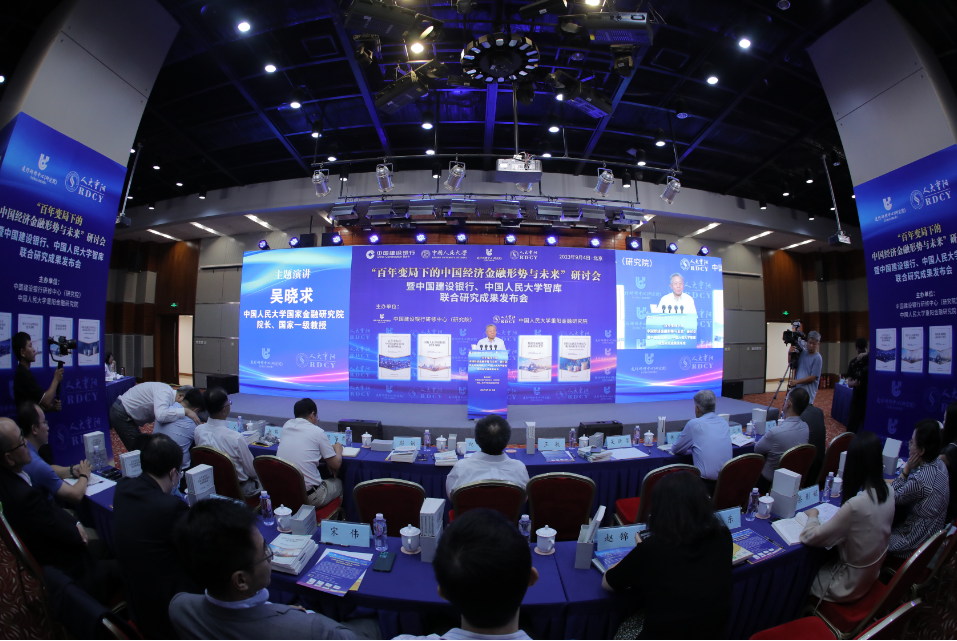
Picture of the Event
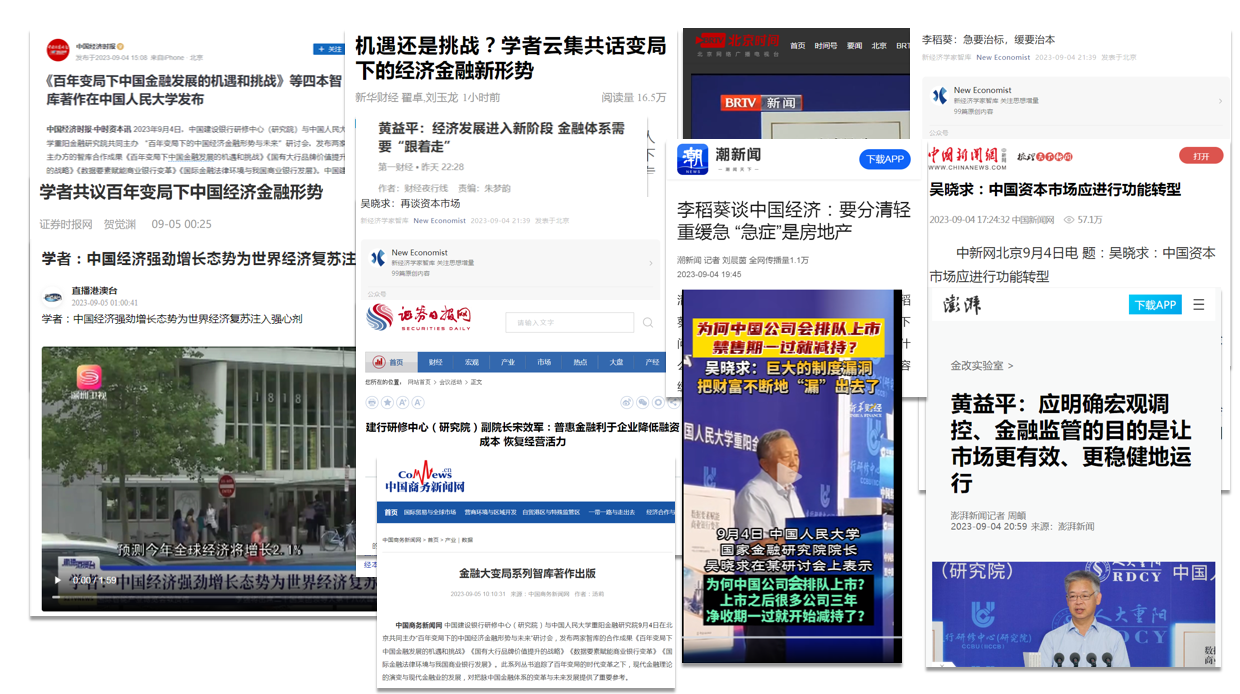
During the opening remarks, Ji Zhihong, Vice President of CCB, and Wang Yi, Vice President of RUC, delivered speeches successively.
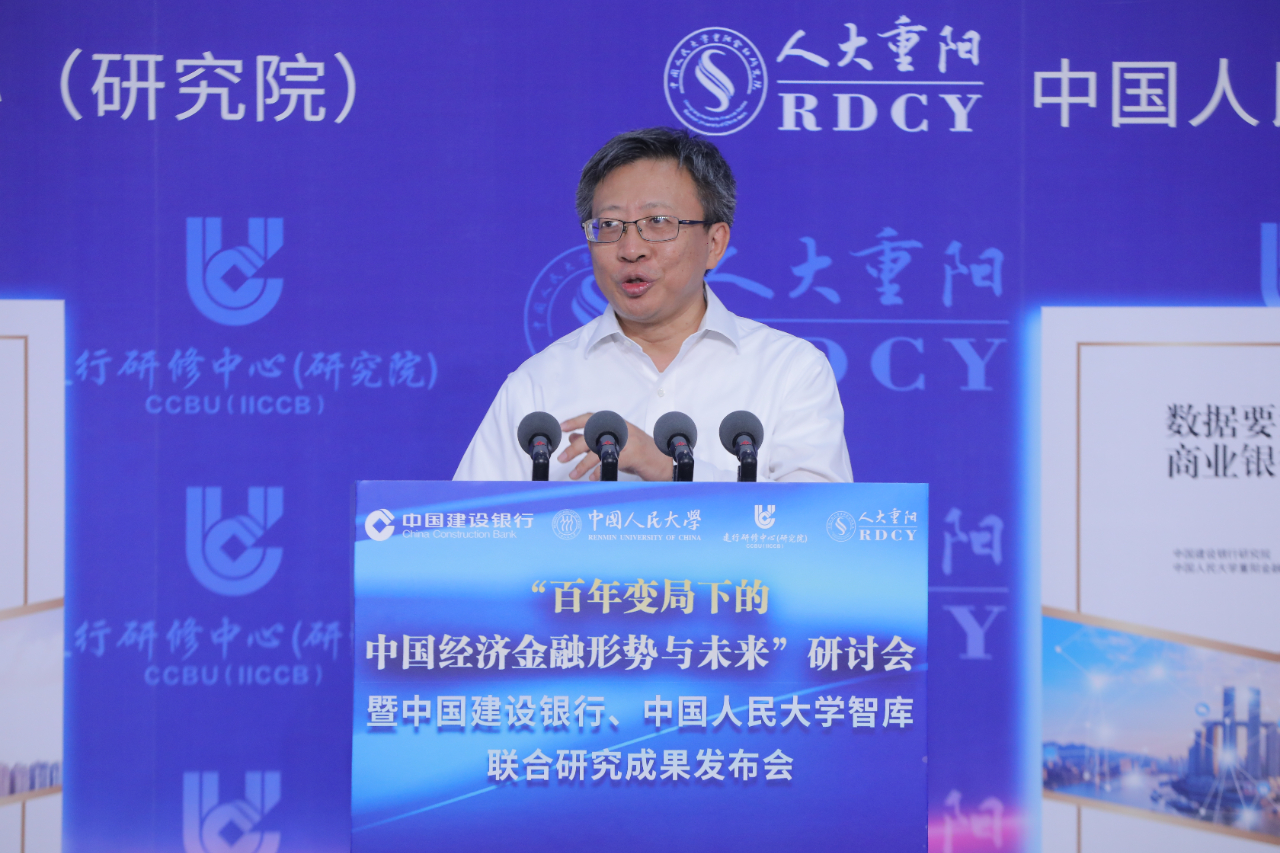
Ji Zhihong, Vice President of CCB
Ji Zhihong illustrates the importance of deepening reforms and pursuing transformational development under the current political and economic situation at home and abroad which is full of "challenges" and "opportunities". He said that under the guidance of Xi Jinping Thought on Socialism with Chinese Characteristics for a New Era, CCB adheres to the work philosophy of serving the country through finance and doing good through finance, deepening its profound understanding of political and people-oriented principles. Besides, CCB has adopted new financial actions to support the real economy, benefit people’s livelihood, and address social pain points. Both RUC and CCB share a commitment to serving people, leading to close cooperation and mutual support. Since signing the bilateral strategic cooperation agreement in 2021, both sides have actively promoted industry-education integration, expanded collaboration in various areas, and innovated their partnership models. Notably, their cooperation in think tank research, digital currency, and smart campus initiatives has yielded significant results. The work released today is an integral part of their two-year joint research efforts, aiming to stimulate thoughts and discussions on pertinent issues.
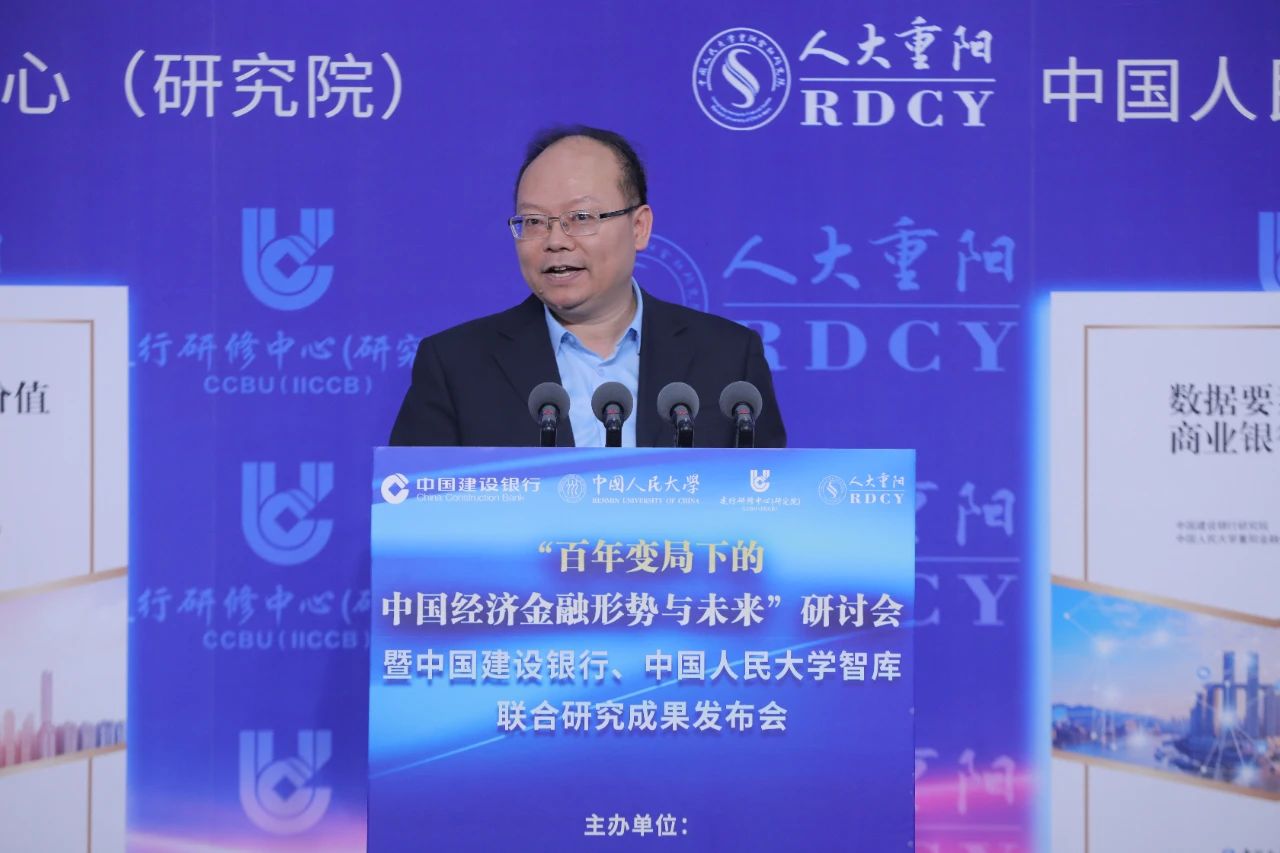
Wang Yi, Vice President of RUC
Wang Yi stated that since 2020, the global security situation has become increasingly complex, with numerous global challenges emerging. Climate changes, digital transformations, and governance challenges have all added to the complexity of the global landscape. Climate change which is related to the survival of human civilization and the building of a community with a shared future for mankind, has become the most urgent issue that all countries must face at present. Digital transformations have triggered the competition for the commanding heights of science and technology in major countries, and the new generation of information technology represented by artificial intelligence is triggering a new round of scientific and technological revolution. Changes in governance have hindered global coordination and cooperation, with global governance fallen into an unprecedented dilemma.The world’s economic structure and international political order are undergoing profound adjustments, and the financial system, as a critical subsystem of human economic and social operations, is experiencing significant changes in the financial industry. This presents both challenges and opportunities for China’s financial development. The publication of this series of books provides essential insights into the transformation and future development of China’s financial system.

Song Xiaojun, Deputy Director of the China Construction Bank University
Song Xiaojun, Deputy Director of the China Construction Bank University (Research Institute), presided over the opening remarks. He acknowledged that the current once-in-a-century transformative period presents challenges to various aspects of our country, including the economy, finance, and society as a whole. Especially, the convergence of multiple factors such as the COVID-19 pandemic and geopolitical tensions has led to a profound shift in the financial landscape. Additionally, the transition from initial friction between China and the United States to the current state of decoupling, has brought about significant changes in the economic and geopolitical circumstances. These factors were the driving forces behind the collaboration between the two institutions.
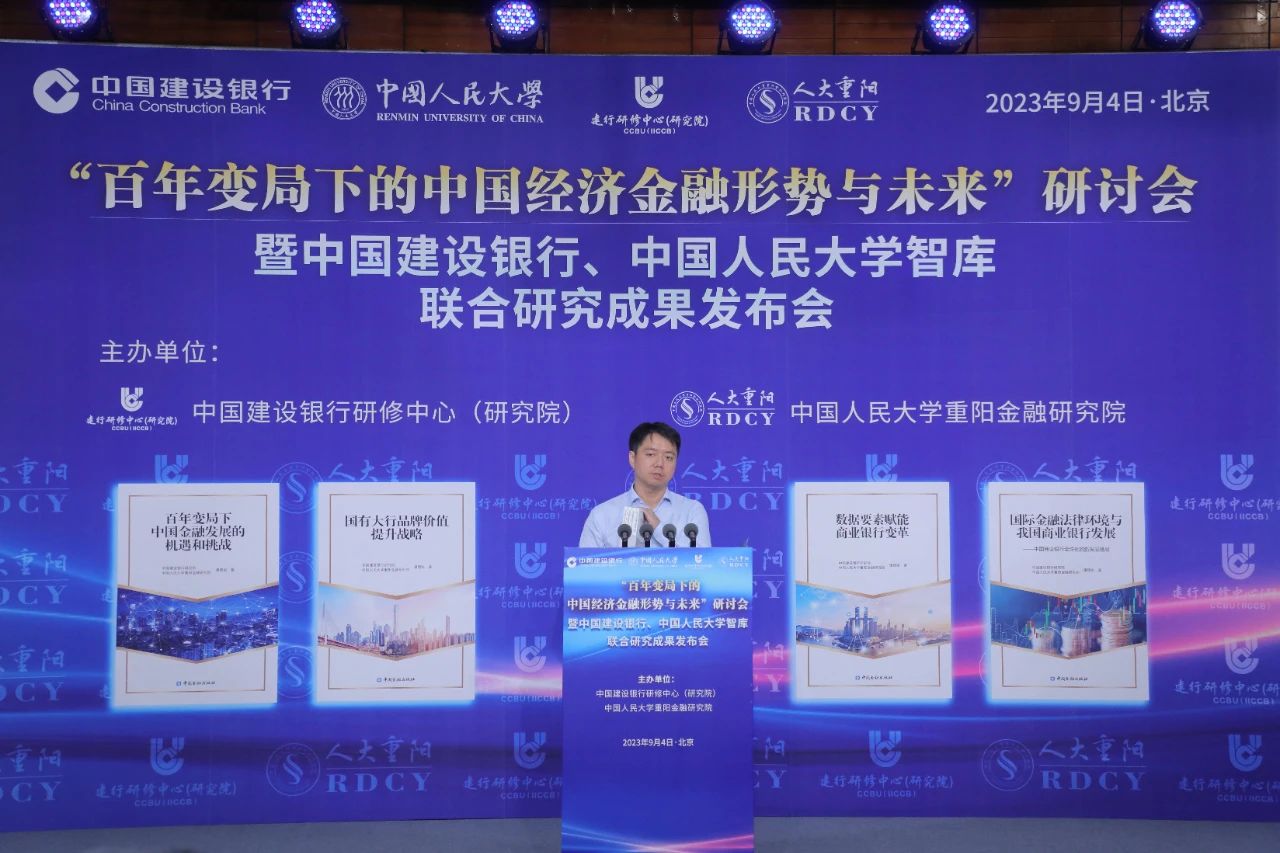
Wang Wen, Executive Dean of RDCY
Following the opening remarks, Wang Wen, Executive Dean of RDCY, presented the collaborative research projects conducted by CCBU and RDCY under the theme of “Financial Transformation in an Era of Great Change.” This cooperative effort, led by Peng Gang, Executive Deputy Director of CCBU, and Wang Wen, invited top financial experts such as Wang Guogang, a professor at the School of Finance at Renmin University of China, and Zhao Xijun, Co-Director of the China Capital Market Institute and Senior Researcher at RDCY to serve as the main principals of the writing team. The research team comprised over 50 members and dedicated more than two years to their collaborative research, resulting in four research projects totaling one million words, all published by the China Financial Publishing House.
This collaboration between RUC and CCB serves as a noteworthy example of cooperation between academia and a bank’s research institute, pioneering a new model and paradigm for cooperation between university-based think tanks and bank-based think tanks. It explores the evolution of modern financial theory and the development of the modern financial industry in an era marked by a century of transformation. Importantly, it provides valuable insights for understanding the changes and future development of China’s financial system.
Subsequently, in the keynote speech, prominent speakers, including Wu Xiaoqiu, Director of the National Institute of Financial Research at Renmin University and a first-class professor, Cao Yuanzheng, Deputy Chairman of the China Macroeconomic Society, Chairman of China International Capital Corporation and Senior Research Fellow at RDCY, Huang Yiping, Deputy Dean of National School of Development at Peking University, Li Daokui, Dean of the Institute of Chinese Economic Thought and Practice at Tsinghua University, Mo Wangui, Deputy Director of the Financial Research Institute at the People’s Bank of China, Yang Dong, Dean of the Interdisciplinary Research Institute and Changjiang Scholar Distinguished Professor at RUC; Wang Guogang, Full Professor at the School of Finance at RUC, Member of the Academic Division of the Chinese Academy of Social Sciences, and Senior Research Fellow at RDCY, Zhao Xijun, Co-Director of the China Capital Market Research Institute and Senior Research Fellow at RDCY, Qiu Zhigang, Professor at the School of Finance at RUC, Cai Tongjuan, Head of the Macro Research Department at RDCY, delivered speeches consecutively.
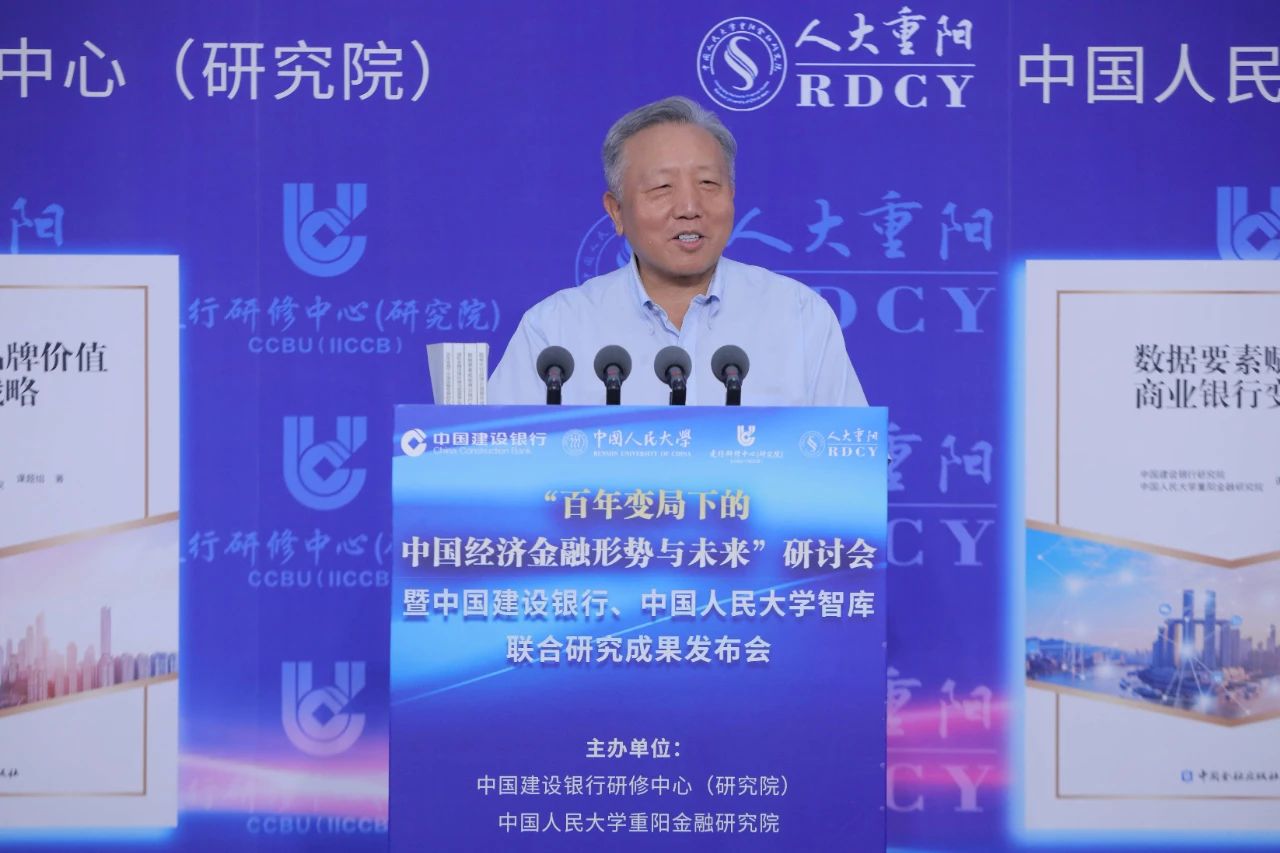
Wu Xiaoqiu, Director of the National Institute of Financial Research at Renmin University and a first-class professor
Wu Xiaoqiu discussed the current challenges in the Chinese economy and emphasized the importance of identifying and addressing these issues. He emphasized the need for confidence among market participants, investors, and entrepreneurs. He believes that China's finance, which is in a period of change, faces three major tasks. Firstly, it must promote the structural reform of China's finance and improve its transformation. Secondly, it must promote the deepening of market-oriented reform, with the core being how to better integrate with our economy structure and industrial upgrading, and to promote the upgrading and iteration of China's economy and industry. Thirdly, we must focus on promoting the internationalization of China's finance and promoting the opening up of China's finance.
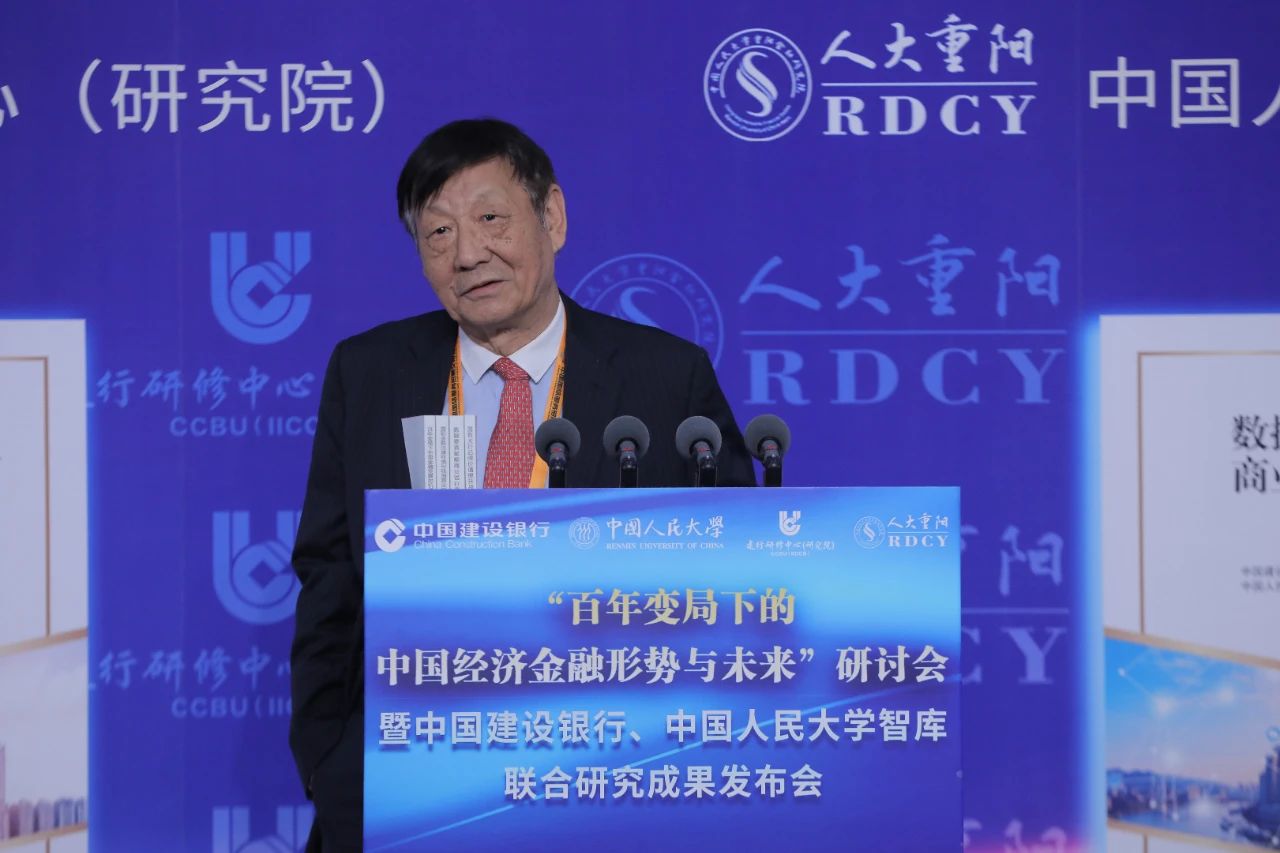
Cao Yuanzheng, Deputy Chairman of the China Macroeconomic Society, Chairman of China International Capital Corporation and Senior Research Fellow at RDCY
Cao Yuanzheng highlighted the aim of the reforms that China’s financial institutions implemented in 2004 is to make financial enterprises self-sustaining entities. China has transformed its banks into share-holding companies, developed its capital market, reformed its financial regulatory system, and built China's modern financial system. He noted that these reforms helped China’s financial sector grow rapidly, but challenges remain, particularly in achieving the full convertibility of the Renminbi in China's financial system reform. This necessitates further opening up of China’s capital markets to the world.

Huang Yiping, Deputy Dean of National School of Development at Peking University
Huang Yiping emphasized that as the economy enters a new phase of development, the financial system must also evolve. This involves enhancing financial efficiency while effectively managing financial risks. He stressed the importance of clear distinctions between macroeconomic regulation, financial supervision, and market mechanisms. Macroeconomic regulation does not mean using administrative measures to directly guide economic activities, and strengthening supervision does not require us to directly dictate asset prices and fund allocation in financial markets. The fundamental purpose of macroeconomic regulation and financial supervision is to make the market operate more efficiently and stably, thereby better supporting the high-quality development of our economy.
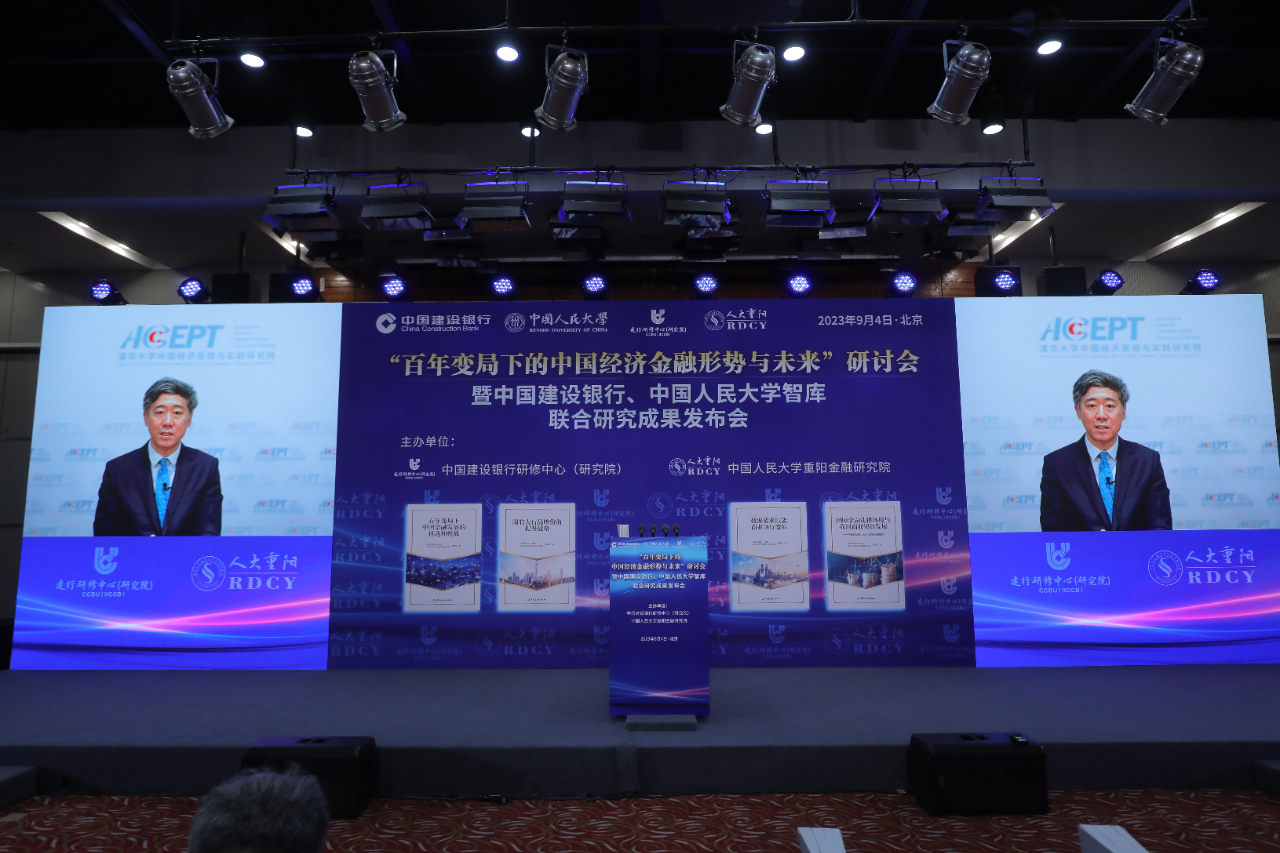
Li Daokui, Dean of the Institute of Chinese Economic Thought and Practice at Tsinghua University
Li Daokui identified urgent and less urgent issues in China’s current economic and financial landscape. Urgent issues include addressing the financial strain faced by real estate developers due to a slowdown in property sales, which requires strategic collaboration with major commercial banks and the provision of credit loans in advance. Less urgent issues involve resolving local government debt, incentivizing private sector investments, and identifying new growth points in the Chinese economy. The treatment should be tailored to the gravity of the issue.
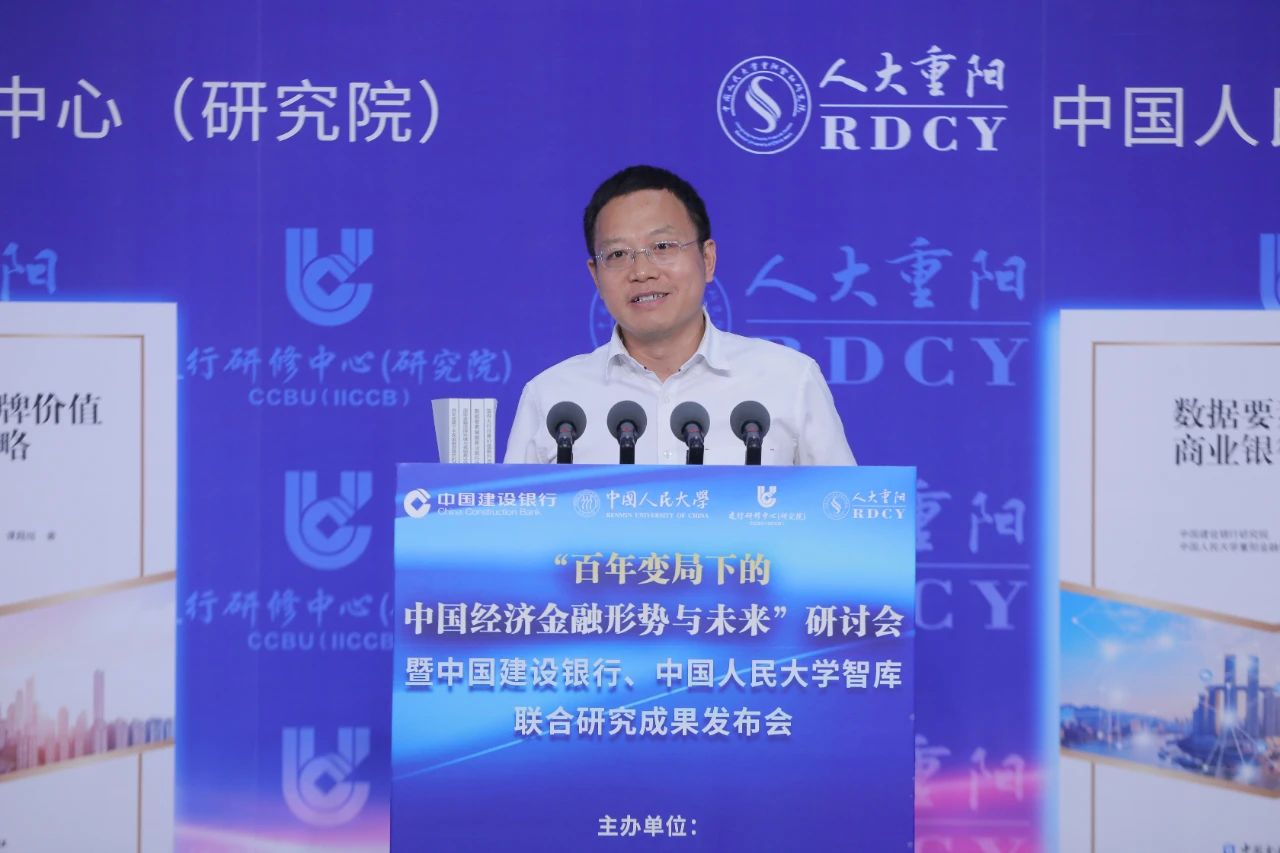
Mo Wangui, Deputy Director of the Financial Research Institute at the People’s Bank of China
Mo Wangui predicted that future economic growth will be driven by new dynamics. Globally, there is a trend of “triple transformation” - deglobalization, digitalization, and green transformation. Domestically, China’s new growth drivers will shift from the previous reliance on exports and real estate to innovation (technological and structural) and consumption. To adapt to these changes, it is essential to explore effective market mechanisms and government intervention to create a favorable environment for innovation and enhance corporate vitality. Adjusting the boundaries between government and market is necessary, with a focus on enhancing market efficiency and stability to support high-quality economic development.
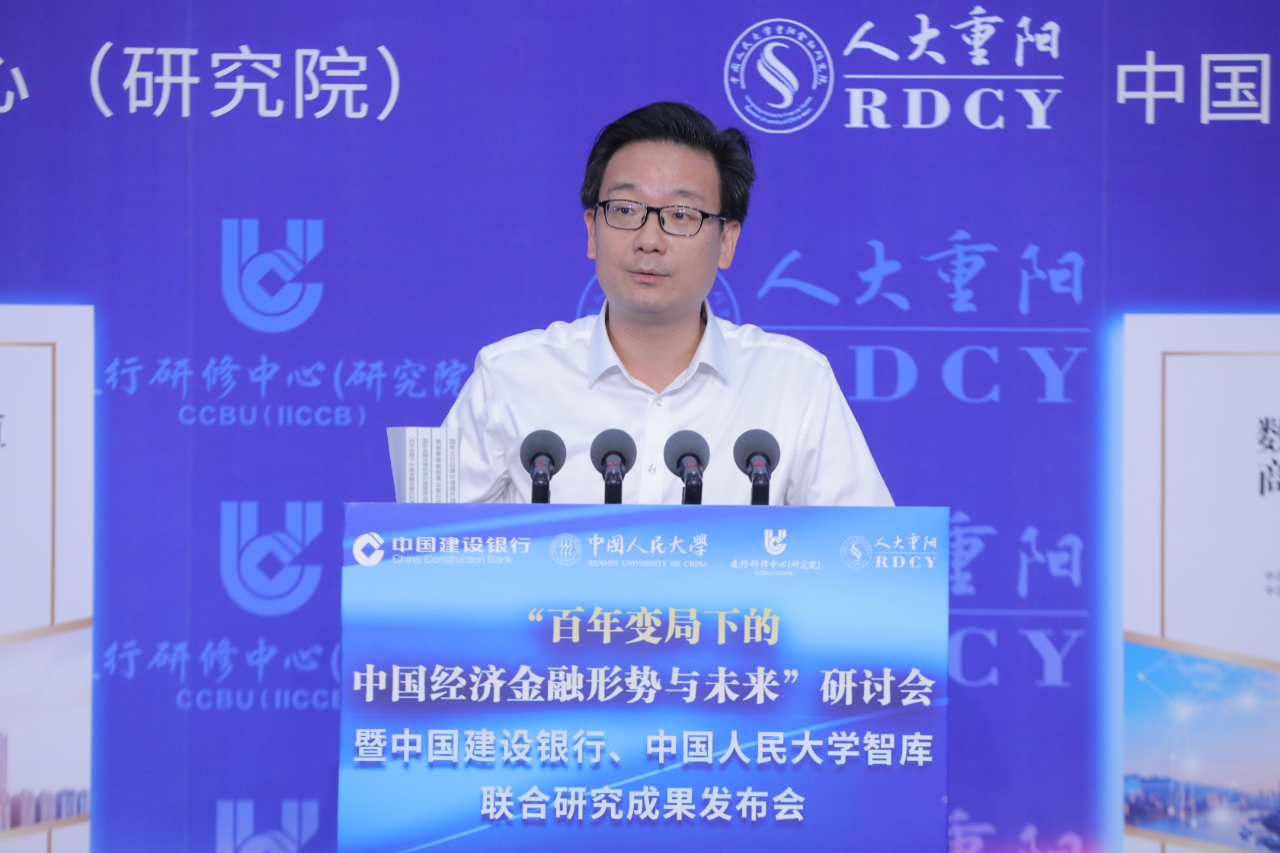
Yang Dong, Dean of the Interdisciplinary Research Institute and Changjiang Scholar Distinguished Professor at RUC
Yang Dong highlighted three major property rights reforms since China’s reform and opening-up, namely land property rights, state-owned equity division which includes state-owned legal person shares, individual shares, and tradable shares, and data property rights, including ownership rights, public rights, economic rights, and income rights. He emphasized that data property rights are a unique aspect of China’s reform efforts and a new engine for future development. In the past, reforms related to land property rights and the separation of state-owned equity were largely inspired by Western practices. However, this time, the reform of data property rights is the one that carries the most distinct Chinese characteristics. In the data elements field, including the entire data economy, China is at the forefront, particularly in areas such as data computing power, algorithms, and the development of large models like ChatGPT.
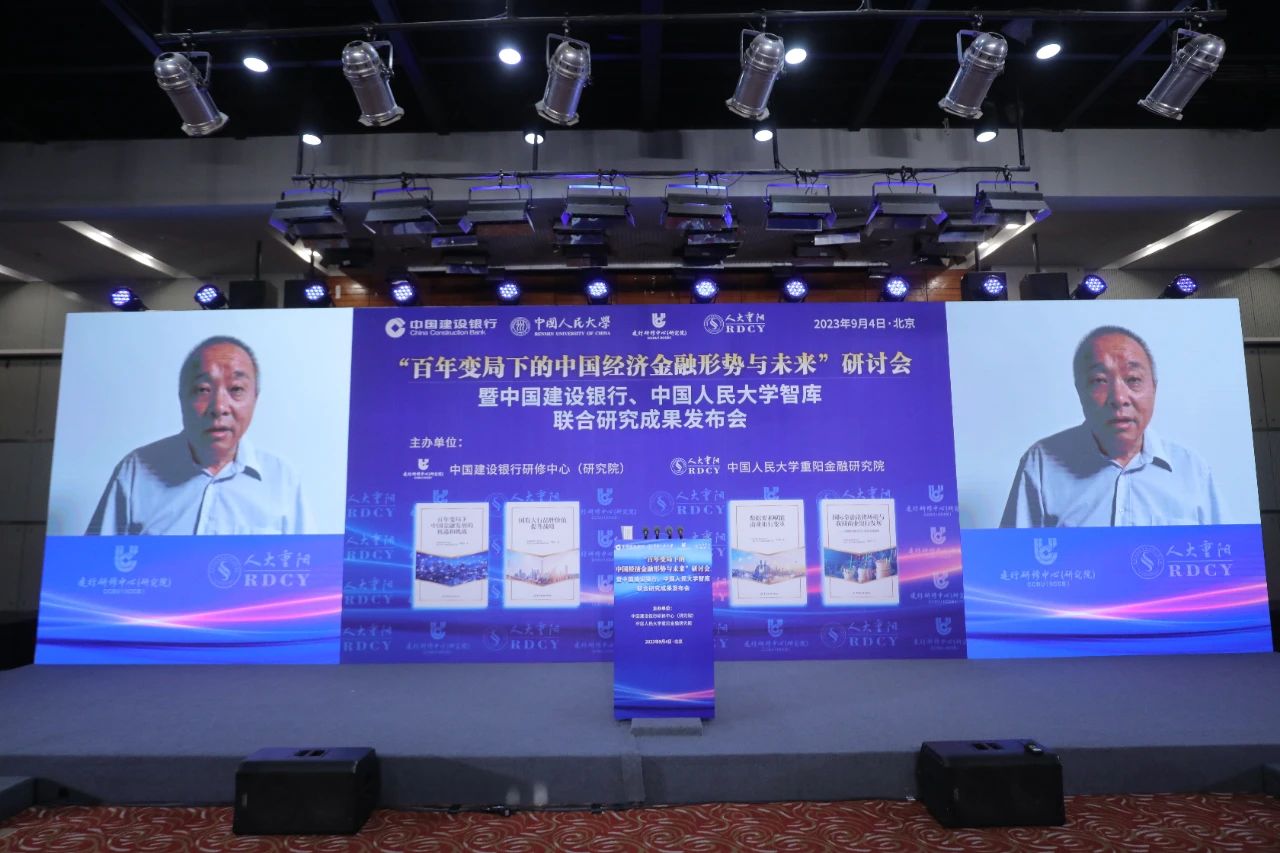
Wang Guogang, Full Professor at the School of Finance at RUC, Member of the Academic Division of the Chinese Academy of Social Sciences, and Senior Research Fellow at RDCY
The report summaries were presented by the leaders of the four research teams. Wang Guogang mentioned that the book of “International Legal Environment and the Development of Chinese Commercial Banks” covered eight aspects, including the new stage, new environment, new risks, new understanding, new effects, new measures, new trends, and new models, hoping that it will be conducive to promoting China’s financial integration into the international financial markets, expanding global business development, and constructing a two-way open financial system that is in line with the domestic and international dual circulation. From a theoretical perspective, it also holds reference value for the global development of Chinese non-bank financial institutions. At the same time, this research project has three characteristics: systematic, operational and forward-looking.

Zhao Xijun, Co-Director of the China Capital Market Research Institute and Senior Research Fellow at RDCY
Zhao Xijun reported on the book of “Brand Value Enhancement Strategy for State-Owned Banks”. He highlighted the importance of innovation for enhancing brand value at state-owned banks. He proposed using digital transformation in Chinese commercial banks to drive brand enhancement. The report analyzed the current status of digital transformation at major commercial banks, identified existing challenges, and suggested corresponding solutions. Facing the phenomenon of China being an “economic powerhouse with weak brands” in the global value chain, state-owned banks need to strengthen their core capabilities and promote China’s brand-building efforts to enhance the soft power of China’s financial development.
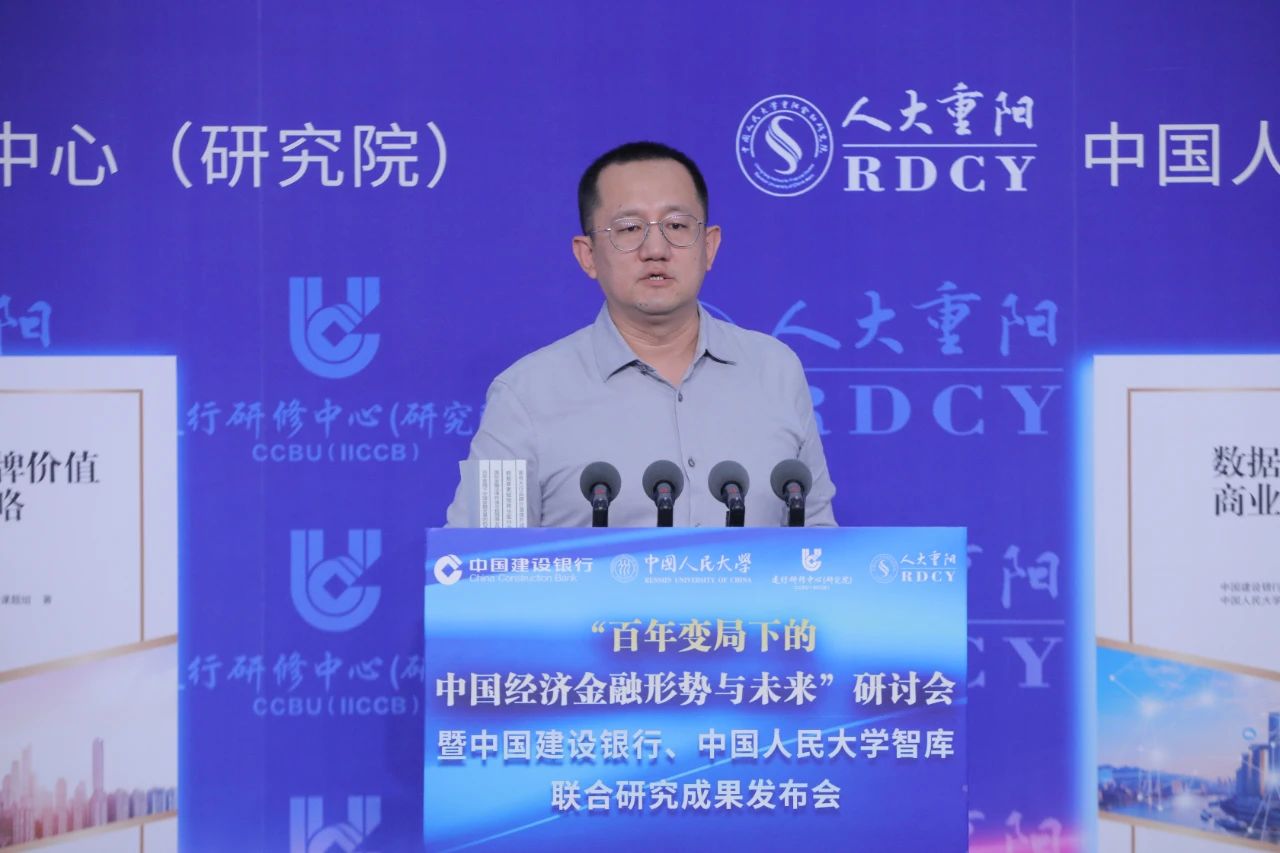
Qiu Zhigang, Professor at the School of Finance at RUC
Qiu Zhigang presented the book on “Empowering Commercial Banks with Data Elements.” He stressed that data elements could serve as both direct production factors and support for the real economy through financial support. To harness the potential of data elements, it is essential to have the necessary resources, including software and hardware infrastructure. Public acceptance and understanding of data are equally crucial. The development index for data elements encompasses its impact on various aspects of the banking industry, both internally and in external environments.
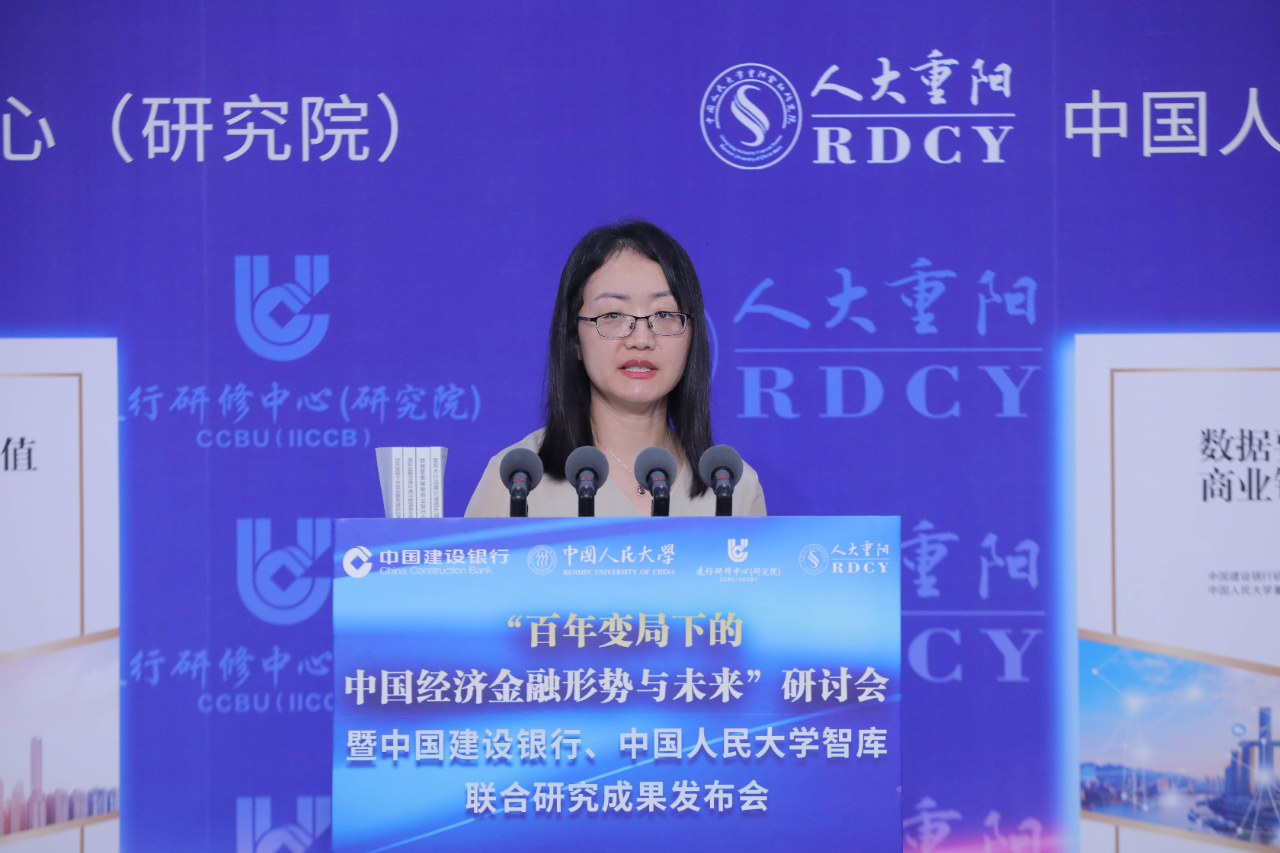
Cai Tongjuan, Head of the Macro Research Department at RDCY
Cai Tongjuan summarized the main content of the book “Opportunities and Challenges of China’s Financial Development in a Century of Changes”. The book aimed to answer what the “century of transformation in the financial industry” is, which variables influence this transformation, and what five key aspects China needs to focus on regarding global financial governance and China’s financial development.
Wang Wen, in his closing remarks, concluded that in recent years, factors such as the COVID-19 pandemic, geopolitical conflicts, climate change, and digital technology have significantly impacted the global political and economic landscape. These factors have accelerated the evolution of the financial sector in an era of a century of transformation. Since the outbreak of the Ukraine crisis in 2022, developed countries like the United States and Europe have continued to impose financial sanctions on Russia, further dividing global financial governance and reducing inclusiveness. Facing the challenge of China’s status as an “economic powerhouse with weak brands” in the global value chain, state-owned banks must enhance their core capabilities and contribute to China’s dream of becoming a strong brand nation by strengthening the soft power of China’s financial development. For commercial banks, data elements are the core competitive advantage in the new era. Promoting the market-based allocation of data elements in China is a fundamental and systematic endeavor. The current international financial legal environment is undergoing significant changes. In the process of Chinese commercial banks “going global,” legal risks have become a focal point for them to address and prevent. Chinese commercial banks need to proactively address issues related to anti-money laundering, counter-terrorism financing, anti-tax evasion, and international sanctions to fully protect the rights of overseas financial consumers.























































































 京公网安备 11010802037854号
京公网安备 11010802037854号





